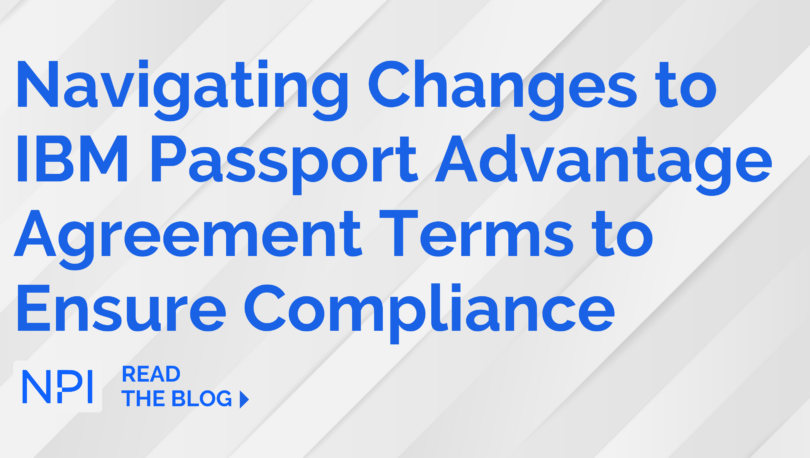In February 2023, IBM unveiled changes to its Passport Advantage Agreement terms that will become effective on May 1 for existing customers. These changes significantly affect customers’ software license compliance obligations. Considering the heightened risk, it’s crucial for customers to do two things. The first is to fully understand the hard and soft implications of these changes. The second is to have a strategy in place to ensure compliance without overburdening SAM and procurement resources.
Over the past decade, enterprise software vendors have deftly shifted more compliance reporting burdens onto their customers. Notable instances include SAP’s annual self-declaration requirement and Microsoft’s Cloud Economics Assessment. IBM’s recent updates to its Passport Advantage Agreement terms aligns with the prevailing trend.
Under IBM’s latest changes, Passport Advantage customers take on increased software compliance reporting responsibilities at a more frequent cadence. Consequently, the possibility of noncompliance discovery is amplified due to more frequent compliance assessment opportunity by IBM. This blog post highlights the updates that will have the most significant impact on compliance risk and reporting. For a more detailed assessment of IBM’s changes, be sure to check out our bulletin on IBM Passport Advantage Agreement Changes: How to Tackle New Compliance Requirements.
Understanding the Implications of Changes to IBM Passport Advantage Agreement Terms
New Compliance Reporting Requirements
One of the most noteworthy changes to IBM’s Passport Advantage agreement terms is the addition of new mandatory compliance reporting requirements. Section 4.1.a of the new agreement terms stipulates clients “create, retain and each year provide to IBM upon request with 30 days’ advance notice: i) a report of deployed Programs, in a format requested by IBM, using records, system tools output, and other system information; and ii) supporting documentation (collectively, Deployment Data).”
Given the vastness of enterprise-scale IBM deployments, few enterprises are currently able to provide this information in a single month’s time. License reconciliation across an IBM estate is a huge undertaking and most companies don’t have the resources to fulfill this request so quickly. NPI recommends customers perform a full license reconciliation (or license position assessment) of their IBM estate now. This will serve as a baseline report that can be feasibly updated upon IBM’s request.
Stricter Language on Reporting
IBM’s new agreement terms enforce stricter language regarding altering approved software reporting tools or reports. This change underscores the need for accurate configurations of IBM’s License Metric Tool (ILMT) to prevent inaccurate reporting, which often favors IBM over customers. The challenge? As of right now, very few enterprises configure ILMT to report accurately. Customers should carefully (and continuously) evaluate their ILMT configurations and reported data for accuracy.
Restrictions on Software Subscription & Support (S&S)
IBM has implemented restrictions on reducing or dropping S&S – a move that’s intended to protect its S&S revenues. If a customer wants to renew expiring S&S at a lower quantity, they must provide documentation that verifies current use and installations at least 30 days prior to renewal date. Failure to deliver required documentation will result in the renewal of all existing quantities. With this in mind, customers that want to drop or reduce S&S must now approach renewals more strategically and much earlier. Be sure to build in enough runway to perform a license position assessment and remediate any compliance risk exposure.
Subscription License Termination Rules
The new terms prevent customers from terminating subscription licenses before their current term concludes, underlining the importance of precise purchasing – make sure buy only what’s needed, when it’s needed, at a fair price, with optimal flexibility. Again, a license position assessment will reveal exactly what is being used and what is not so that you have a fact-based demand definition.
How to Tackle the Challenges of New IBM Passport Agreement Terms
The changes to IBM Passport Advantage agreement terms pose a significant challenge for enterprise customers. These alterations require SAM and procurement leaders to divert resources, money, and time, potentially impacting budgets and tech roadmap execution.
Our advice to IBM Passport Advantage customers is to stay ahead of the risk. One tactic is to adopt a highly proactive approach towards license reporting, compliance, and renewal events. Another is to enlist the help of outside IBM licensing and compliance expertise to minimize both penalty exposure and the compliance burden on internal resources.
Have questions about IBM software compliance and contract optimization? We can help. Contact us.
RELATED CONTENT
- Bulletin: IBM Passport Advantage Agreement Changes: How to Tackle New Compliance Requirements
- Blog: IBM Monthly License Charges Increasing More than Usual
- Blog: 5 Questions to Ask to Reduce Software Renewal Costs
- Bulletin: What to Do Now to Prepare for Increased Software Audit Activity
- NPI Service: Enterprise Software License Optimization Consulting
- NPI Service: Software License Audit Services
